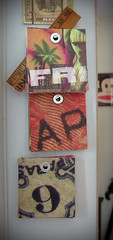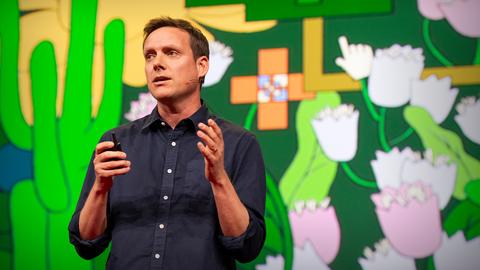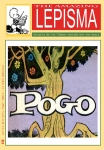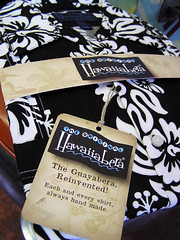Pros with Macs - Interview: David Was and the Digital Music Revolution
Permit us to turn the clock back to the early 1980s when Ronald Regan was President and the Cold War was still raging; Rock had survived Disco, but a New Wave assault was underway; Madonna was still shocking, and Prince still had a name.
Somewhere in the mash of MTV, Album Rock, and New Wave, a Detroit duo -- David Weiss and Don Fagenson -- replaced their last names with "Was," dropped their studio musician jobs, and started a band. Over the years they generated a handful of dance hits -- remember "Walk the Dinosaur?" -- and churned through the most eclectic roster of guest artists you can imagine. (Who knew that Bonny Raitt and Mel Tormé once sang with the same band?) David and Don Was remained friends after the band broke up, and both have continued to work as producers, arrangers, composers, and all-round music doctors.
David Was is this week's Pro with a Mac. We tracked him down because we'd heard he uses a Logic-equipped Mac for all of his studio work. While he expressed a deep satisfaction with the platform, he hardly came off as a Mac zealot. It quickly became clear that he views the Mac as nothing more or less than the best tool for his job as an artist. Indeed, it was art, rather than the tools he uses to create it, that we spent most of our time talking about.
In two hours of discussion, Mr. Was argued both sides of nearly every question we posed. (At one point he quoted a critic of his: "This guy could find two sides to a billiard ball!") Along the way, though, he dropped countless crumbs of music-related gossip, venom, and wisdom, and below we reproduce as much as we can fit.
David Was, Mac User
From the beginning, David Was was aware of developments in digital music technology. He had a Mac II with a one-in, one-out MIDI interface and Digidesign's Sound Designer II. "It's like B.B. King claiming he learned guitar with a broomstick and a piece of piano wire," he brags. Today he works on a PowerMac Dual G5, but he still keeps his old Mac IIfx, and it still contains his old samples.
In a characteristic digression, what starts as a history of his experience with the Mac quickly melts into a nostalgia trip. "All these astonishingly powerful programs" are at his fingertips, he says, contrasting the '80s editing software as a "Wright Brothers plane" to modern software's "rocket ship." "You'd have to have your head examined, but I actually miss it [making music samples by hand]."
In the last few years, David Was has also started using Final Cut Pro HD, extending his artistic interests into digital video. Still, his admiration of the platform itself is purely practical: "It's becoming a standard," he says.
Music Downloads
Not surprisingly, Mr. Was's music is available on the iTunes Music Store, along with countless songs that he has helped to create. So what does he think about digital music distribution?
Mr. Was: I think it was amazing that Apple, which I've always equated with a kind of rebel, anticorporate kind of company, that they could step into the fray between the record business and the filesharing community. I think it was a propos that it was Apple.
TMO: Some bands (take Metallica as the stock example) have resisted having their music sold on the iTMS, especially as singles. What do you think about that?
Mr. Was: You know, I think it's a funny thing. I'm definitely a hippie capitalist. I love the serendipity of getting paid for sitting in a dark room and writing some rhymes. You are so grossly overpaid for the effort you put in. These guys got paid a thousand times over for what their estimable talents deserved. When I get my royalty check I might see seven dollars less because someone decided to steal my song, but I'm glad a million more people can experience my music.
However Mr. Was, as usual, shows a sensitivity to the counterargument: "If you made a good album," you've created a work that is "political, personal, spiritual." You intend "to sit people down and force them through the process of sitting there for an hour. That's your fantasy. But on the other hand, you can't stop this juggernaut."
Apple, the Great Democratizer
That "juggernaught" is the move to legal digital music distribution, which Apple has pioneered. So what effect is Apple is having on the music industry? The mild, wistful tone of his voice breaks.
Mr. Was: At this point I think it's pretty huge. If you'll allow me to go on a brief diatribe about the music business, I realized at a certain point that this is a business that evolves out of organized crime.
Mr. Was says this with a tone of perfect calm and perfect seriousness. He names standard demands to which artists and small club owners bow, under threat of blacklist, like block booking and free performances for radio stations. With great enthusiasm, he suggests that the hard-edged, frequently corrupt world of bars and clubs has become institutionalized in the record industry. Ultimately, he continues:
Mr. Was: The artist has never gotten a fair shake. When the filesharing era started, I thought, 'This appeals to the rebel in me, even if they're stealing from me.' There was something about sticking it in the eye of these guys who had been ripping off the public.
Then comes the dénouement, where he admits, "Of course, I also have an eye on my own piggybank, and I realized the danger." He ends with the words of a centrist ideologue: "In the end, I think it's healthy in the sense that it's made this business famous for its corruption tighten its belt."
Mr. Was also admires the economic democratization of the digital revolution. An all-digital studio is far less expensive than its analog predecessors, and twice, first in reference to digital music and again in reference to digital film, he quipped, "You can make hurt happen in your bedroom." Of the democratization of music he declares: "I think it's as good for art as it is for commerce."
Digital versus Analog
Can the digital revolution be bad for art? There's a long history of nail biting and name-calling over the migration from analog to digital sound. Audiophiles trumpet the better sound of analog equipment, while the general public enjoys the flexibility of digitized music. Mr. Was happily squats directly over the ideological fault line.
Mr. Was: If you're an audiophile, I'm all for it. [People] clucked and wagged their fingers when the Beatles started using multitrack. I believe the same clucking and finger wagging is going on now with the digital world. I defy anyone except these super technocrats to tell the difference.
When I was in 10th grade I met a dancer, just a beautiful young woman. I had fine [stereo] equipment in my room, and I was real conscious of that crap. And I'd blast stuff like Berlioz with one speaker in each ear. [Once] I went in to this girl's bedroom and she played me a Beethoven piece on a scratchy five-inch speaker, and she was transported farther than I'd ever gone, on the wings of the music alone, not the sound of it. She was milking the soul of the music whole.
You have to bring a soul to feel the soul. There's probably someone out there, who's capacity to feel is equal to their capacity to discern. But that's rare. It's like bringing a bucket to a fire. It's good if the bucket doesn't leak, but it doesn't have to be made by Tiffany, either.
The real question is, 'Does it feel like it happened.' I'm less interested in a live musician who's not a consummate artist than I am in a programmer who can make you get out of your chair. In the hip hop world, it's all programming. They've brought drums to the forefront in a way that no one else could have done. I don't want to hasten the obsolescence of live music, but...
At the end of the day, though, Mr. Was doesn't spend his time making classical music, or hip hop. So how has the digital revolution changed his own process in the studio? What does he do differently now than when he worked in analog?
Mr. Was: On the one hand, the process is exactly the same. [I have to make] mixing decisions about where to place things, where to pan, about echo, delay, compression. But these luddites who are married to the analog world will find something [wrong with it].
I don't believe you have to succumb to the perfection that all this audio hardware and software offers you. I want it to sound like you poured a stiff glass of bourbon on the hard disk, so it comes out feeling like there's a human hand in it. [I want] to get the loosey-goosey feeling [of] a one-AM Chicago session.
And with that, we'll leave you with our usual grab-bag of finishing questions.
Five for the Fans:
1. What computers do you own and what kind of computer speakers do you use?
17" Powerbook with Altec Lansings and a PowerMac Dual G5 running Logic 7.0 and Final Cut Pro HD. Output is through MAudio board, a Mackie 32 track mixer, and Hafler monitors.
2. Of all the artists you've partnered with, who was the most fun?
Bob Dylan, recording "Under the Red Sky." He cites "the privilege of going into the boiler room of genius...to see the naturalness, and the monumental struggle involved in doing something as an adult that as a kid you did just out of youthful exuberance....Being able to experience this guy's natural instinct and experience, combined with his wit...going to the studio every day was like visiting with Einstein or something."
3. Among the bazillion musical decisions you've made, what's the single best?
The hook ("Boom boom, acka lacka-lacka boom") to "Walk the Dinosaur," which was "As silly and successful as I've ever been in my life."
4. What's the best album of all time?
Miles Davis records in the mid to late '60s. "This was the best classical music that was being made in the world at that time."
5. What's the greatest instrument you never learned to play?
Cello. If the alto sax can sing like a woman, the cello sings like a man.
Thanks to Ricky Spero & David Was
Thursday, December 02, 2004
Subscribe to:
Comments (Atom)



























































